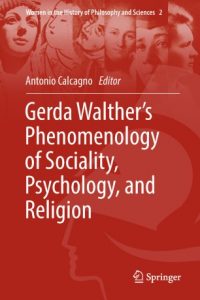Editors: Ruth Hagengruber, Mary Ellen Waithe, Gianenrico Paganini
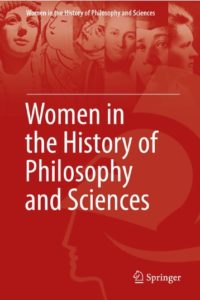
“As the historical records prove, women have long been creating original contributions to philosophy. We have valuable writings from female philosophers from antiquity and the Middle Ages, and a continuous tradition from the Renaissance to today. The history of women philosophers thus stretches back as far as the history of philosophy itself. The presence as well as the absence of women philosophers throughout the course of history parallels the history of philosophy as a whole. Edith Stein, Hannah Arendt, and Simone de Beauvoir, the most famous representatives of this tradition in the twentieth century, did not appear from nowhere. They stand, so to speak, on the shoulders of the female titans who came before them. The ever-growing market of scholars and students of women’s contributions to philosophy and science is a strong indicator that the series Women in the History of Philosophy and Sciences will be successful as the series Women Philosophers and Scientists published by Springer VS, the 4-Volume series a History of Women Philosophers and several other works the editors have published with Springer. WHPS will be of interest not only to the international philosophy community, but also for scholars in history of science and mathematics, the history of ideas, and in women’s studies.”
If you want to contribute send a Book Proposal to Ruth E. Hagengruber,Mary Ellen Waithe, and Gianerico Paganini. The Springer Series Women in the History of Philosophy and Sciences provides a platform for publishing cutting-edge scholarship on women’s contributions to the sciences, to philosophy, and to interdisciplinary academic areas. The Springer Series Women in the History of Philosophy and Sciences will publish monographs, handbooks, collections, anthologies, and dissertations.
-
Volume I: Women Phenomenologists on Social Ontology
Luft, Sebastian and Hagengruber, Ruth (2018): Women Phenomenologists on Social Ontology, Basel: Springer Nature Switzerland AG.

“This edited volume examines women’s voices in phenomenology, many of which had a formative impact on the movement but have be kept relatively silent for many years. It features papers that truly extend the canonical scope of phenomenological research. Readers will discover the rich philosophical output of such scholars as Edith Stein, Hedwig Conrad-Martius, and Gerda Walther. They will also come to see how the phenomenological movement allowed its female proponents to achieve a position in the academic world few women could enjoy at the time.
The book explores the intersection of social ontology, phenomenology, and women scholars in phenomenology. The papers offer a fresh look at such topics as the nature of communities, shared values, feelings, and other mental content. In addition, coverage examines the contributions of Jewish women to the science, who were present at the beginning of the phenomenological movement. This remarkable anthology also features a paper on Gerda Walther written by Linda Lopez McAlister, former editor of the feminist journal Hypatia, who had met Walther in 1976.
This book features work from the conference “Women Phenomenologists on Social Ontology,” held at the University of Paderborn. Overall, it collects profiles and analysis that unveil a hidden history of phenomenology.”
-
Volume II: Gerda Walther’s Phenomenology of Sociality, Psychology, and Religion
Calcagno, Antonio (2018): Gerda Walther’s Phenomenology of Sociality, Psychology, and Religion, Basel: Springer Nature Switzerland AG.
“This book explores the philosophical writings of Gerda Walther (1897–1977). It features essays that recover large parts of Walther’s oeuvre in order to show her contribution to phenomenology and philosophy. In addition, the volume contains an English translation of part of her major work on mysticism.
The essays consider the interdisciplinary implications of Gerda Walther’s ideas. A student of Edmund Husserl, Edith Stein, and Alexander Pfänder, she wrote foundational studies on the ego, community, mysticism and religion, and consciousness. Her discussions of empathy, identification, the ego and ego-consciousness, alterity, God, mysticism, sensation, intentionality, sociality, politics, and woman are relevant not only to phenomenology and philosophy but also to scholars of religion, women’s and gender studies, sociology, political science, and psychology.
Gerda Walther was one of the important figures of the early phenomenological movement. However, as a woman, she could not habilitate at a German university and was, therefore, denied a position. Her complete works have yet to be published. This ground-breaking volume not only helps readers discover a vital voice but it also demonstrates the significant contributions of women to early phenomenological thinking.”
-
Volume III: Methodological Reflections on Women’s Contribution and Influence in the History of Philosophy
Thorgeirsdottir, Sigridur and Hagengruber, Ruth (2020): Methodological Reflections on Women’s Contribution and Influence in the History of Philosophy, Basel: Springer Nature Switzerland AG.

“This book introduces methodological concepts aimed at including women in the canon of the history of philosophy. The history of women philosophers is as long and strong as the history of philosophy, and this holds true not only for the European tradition, as the research of women philosophers of the past shows. The phenomenon of ignoring and excluding women in 19th and 20th century views on the history of philosophy was a result of the patriarchal tradition that ostracized women in general. In this book, leading feminist philosophers discuss methodologies for including women thinkers in the canon and curricula of philosophy. How does the recovery of women thinkers and their philosophies change our view of the past, and how does a different view of the past affect us in the present? Studying a richer and more pluralistic history of philosophy presents us with worlds we have never entered and have never been able to approach. This book will appeal to philosophers and intellectual historians wanting to view the history of philosophy in a new light and who are in favor of an inclusive perspective on that history. “
-
Volume IV: Women, Philosophy and Science
Ebbersmeyer, Sabrina and Paganini, Gianni (2020): Women, Philosophy and Science, Basel: Springer Nature Switzerland AG.

“This book sheds light on the originality and historical significance of women’s philosophical, moral, political and scientific ideas in Italy and early modern Europe. Divided into three sections, it starts by discussing the women philosophers’ engagement with the classical inheritance with regard to the works of Moderata Fonte, Tullia d’Aragona and Anne Conway. The next section examines the relationship between women philosophers and the new philosophy of nature, focusing on the connections between female thought and the new seventeenth- and eighteenth-century science, and discussing the work of Camilla Erculiani, Margherita Sarocchi, Margaret Cavendish, Mariangela Ardinghelli, Teresa Ciceri, Candida Lena Perpenti, and Alessandro Volta. The final section presents male philosophers’ perspectives on the role of women, discussing the place of women in the work of Giordano Bruno, Poulain de la Barre and the theories of Hobbes and Rawls. By exploring these women philosophers, writers and translators, the book offers a re-examination of the early modern thinking of and about women in Italy.”
-
Volume V: Hedwig Conrad-Martius’ Ontological Phenomenology
Hart, James G. and Parker, Rodney K. B. (2020): Hedwig Conrad-Martius’ Ontological Phenomenology, Basel: Springer Nature Switzerland AG.
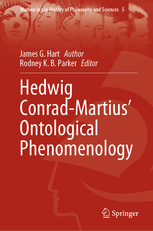
“This work is an introduction to the totality of the metaphysical philosophy of nature of Hedwig Conrad-Martius (1888-1966). Her own training and inclination as a realist phenomenologist enables a unique perspective on central issues in modern and contemporary (twentieth century) theoretical biology and physics. Here we find novel theories of, e.g., space and time, as well as development and evolution. This work is thus of interest to anyone studying the history of the phenomenological movement as well as religious cosmology.
The philosophical basis for this cosmology is Conrad-Martius’ “realontology” which is a phenomenological account of the essence of appearing reality. The full elaboration of the modes of appearing of what is real enables the unfolding of an analogical theory of “selfness” within the order of nature culminating in an account of the coming to be of humans, for whom there is an essentially distinctive world- and self-manifestation for which she reserves the term “spirit.” Key to her position is the revival of ancient metaphysical themes in new transformed guises, especially potentiality and entelechy.
Nature’s status, as a self-actuation of world-constituting essence-entelechies, places Conrad-Martius in the middle of philosophical-theological discussions of, e.g., the hermeneutical mandate of demythologization as well as the nature of evolution. Of special interest is her insistence on both nature’s self-actuating and evolving powers and a robust theory of creation.” -
Volume VI: Against All Odds
Kaufholz-Soldat, Eva, M.R. and Oswald, Nicola (2020): Against All Odds, Basel: Springer Nature Switzerland AG.

“This book presents an overview of the ways in which women have been able to conduct mathematical research since the 18th century, despite their general exclusion from the sciences. Grouped into four thematic sections, the authors concentrate on well-known figures like Sophie Germain and Grace Chisholm Young, as well as those who have remained unnoticed by historians so far. Among them are Stanisława Nidodym, the first female students at the universities in Prague at the turn of the 20th century, and the first female professors of mathematics in Denmark. Highlighting individual biographies, couples in science, the situation at specific European universities, and sociological factors influencing specific careers from the 18th century to the present, the authors trace female mathematicians’ status as it evolved from singular and anomalous to virtually commonplace.
The book also offers insights into the various obstacles women faced when trying to enter perhaps the “most male” discipline of all, and how some of them continue to shape young girls’ self-perceptions and career choices today. Thus, it will benefit scholars and students in STEM disciplines, gender studies and the history of science; women in science, mathematics and at institutions, and those working in mathematics education.” -
Volume VII: The Legacy of Tatjana Afanassjewa
Uffink, J., Valente, G. and Werndl, C., Zuchowski (2021): The Legacy of Tatjana Afanassjewa, Basel: Springer Nature Switzerland AG.
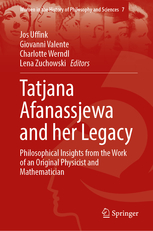
“This book presents a collection of essays that explore the life and works of Tatjana Afanassjewa (1876–1964), a Russian–Dutch physicist–mathematician. Readers will discover a scientist whose work on the foundations of thermodynamics significantly influenced the field itself as well as the philosophy of physics. This book highlights the philosophical consequences of her work in physics and mathematics and discusses historical aspects of her writings on the foundations of physics. In addition, it features English translations and critical reviews of key selections from her texts.
First and foremost, the book highlights the numerous contributions that Afanassjewa made to the field. In particular, the authors examine her work on the foundations of thermodynamics and statistical physics, starting in the 1920s and extending to 1956, well after the untimely death of her husband in 1933. They also explore her almost entirely forgotten work on the didactics of mathematics. In addition, they discuss her influential collaboration with her husband, the Austrian physicist Paul Ehrenfest (1880–1933).
The portrait that emerges is that of a highly original physicist and mathematician, whose legacy continues to influence scientists and philosophers today and whose lesser-known works deserve more attention than they have received. Readers will find a rich body of work that continues to this day to yield insights into the foundations of physics and mathematics.” -
Volume VIII: Hedwig Conrad-Martius
Miron, Ronny (2021): Hedwig Conrad-Martius, Basel: Springer Nature Switzerland AG.
“This volume, the first of its kind written in English, interprets the realistic-phenomenological philosophy of Hedwig Conrad-Martius (1888-1966). She was a prominent figure in the Munich-Göttingen Circle, the first generation of phenomenology after Edmund Husserl (1859-1938), and was known as the “first lady of German philosophy”. The articles included in this collection deal with the two main themes constituting her realistic-metaphysical phenomenology: Being and the I. In addition, the collection includes a comprehensive Preface that describes the personal background and the social and philosophical contexts behind Conrad-Martius’s thought, with an emphasis on the mutual influence and fertilization of the group of early phenomenologists in the Munich-Göttingen Circle. The book will be of interest to scholars of philosophy and educated readers.”
There is now a second edition available!
-
Volume IX: Elisabeth of Bohemia (1618–1680): A Philosopher in her Historical Context
Ebbersmeyer, Sabrina and Hutton, Sarah (2021): Elisabeth of Bohemia (1618–1680): A Philosopher in her Historical Context, Basel: Springer Nature Switzerland AG.

“This book showcases Elisabeth of Bohemia, Princess Palatine (1618-1680), one of the foremost female minds of the 17th century. Best known today for her important correspondence with the philosopher René Descartes, Elisabeth was famous in her own time for her learning, philosophical acumen, and mathematical brilliance. She was also well-connected in the seventeenth-century intellectual circles. Elisabeth’s status as a woman philosopher is emblematic of both the possibilities and limitations of women’s participation in the republic of letters and of their subsequent fate in history. Few sources containing her own views survive, and until recently there has been no work on Elisabeth as a thinker in her own right. This volume brings together an international team of scholars to discuss her work from a cross-disciplinary perspective on the occasion of her fourth centenary. It is the first collection of essays to examine a range of her interests and to discuss them in relation to her historical context. The studies presented here discuss her educational background, her friendships and contacts, her interest in politics, religion, and astronomy, as well as her views on politics, her moral philosophy and her engagement with Cartesianism. The volume will appeal to historians of philosophy, historians of political thought, philosophers, feminists and seventeenth-century historians.”
-
Volume X: Hannah Arendt: Challenges of Plurality
Robaszkiewicz, Maria and Matzner, Tobias (2022): Hannah Arendt: Challenges of Plurality, Basel: Springer Nature Switzerland AG.

“This volume explores challenges posed by plurality, as understood by Hannah Arendt, but also the opportunities it offers. It is an interdisciplinary collection of chapters, including contributions from different traditions of philosophy, political science, and history. The book offers novel perspectives on central issues in research on Arendt, reconfiguring the existing interpretations and reinforcing the line of interpretation illuminating the phenomenological facets of Arendt’s theory. The authors of the contributions to this volume decisively put the notion of plurality in the center of the collected interpretations, pointing out that plurality in its dialectic form of commonality, and difference is not only, as assumed by default, one of the most important notions in Arendt’s theory, but the very central one. At the same time, plurality is a central issue in many current debates, from populism and hate speech to migration and privacy. This collection therefore connects the theoretical advancements regarding Arendt and other political thinkers with some of the most pressing contemporary issues. This book will be of interest to scholars and advanced students from philosophy, political theory and related fields studying contemporary challenges of plurality as well as scholars interested in the work of Hannah Arendt.”
-
Volume XI: Ethics and Metaphysics in the Philosophy of Edith Stein
Andrews, Michael F. and Calcagno, Antonio (2022): Ethics and Metaphysics in the Philosophy of Edith Stein, Basel: Springer Nature Switzerland AG.
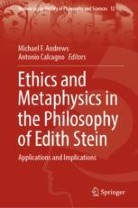
This book is dedicated to Edith Stein (1891–1942), who is known widely for her contributions to metaphysics. Though she never produced a dedicated work on questions of ethics, her corpus is replete with pertinent reflections.
This book is the first major scholarly volume dedicated to exploring Stein’s ethical thought, not only for its wide-ranging content, from her earlier to later works, but also for its applications to such fields as psychology, theology, education, politics, law, and culture. Leading international scholars come together to provide a systematic account of Stein’s ethics, highlighting its relation to Stein’s highly developed and complex metaphysics. Questions about the good, evil, the rights and ethical comportment of the person, the state, and feminism are addressed.
The book appeals to scholars interested in the history of philosophical and ethical thought.
-
Volume XII: Époque Émilienne
Hagengruber, Ruth Edith (2022): Époque Émilienne, Basel: Springer Nature Switzerland AG.
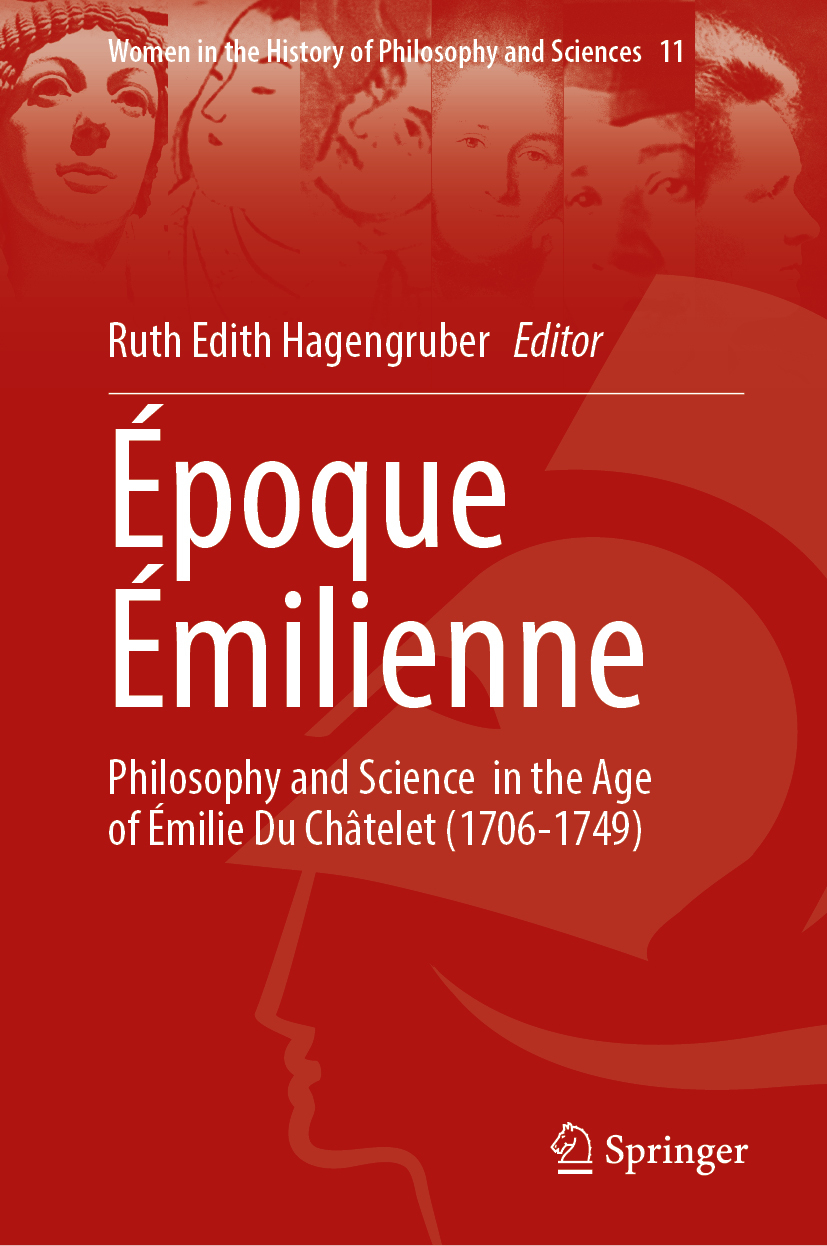
The present book contextualizes Du Châtelet’s contribution to the philosophy of her time. The editor offers this tribute to an Époque Émilienne as a collection of innovative papers on Emilie Du Châtelet’s powerful philosophy and legacy.
Du Châtelet was an outstanding figure in the era she lived in. Her work and achievements were unique, though not an exception in the 18th century, which did not lack outstanding women. Her personal intellectual education, her scholarly network and her mental acumen were celebrated in her time, perceiving her to have “multiplied nine figures by nine figures in her head”. She was able to gain access to institutions which were normally denied to women. To call an epoch an Époque Émilienne may be seen as daring and audacious, but it will not be the last time if we continue to bring women philosophers back into the memory of the history of philosophy.
The contributors paid attention to the philosophical state of the art, which forms the background to Du Châtelet’s philosophy. They follow the transformation of philosophical concepts under her pen and retrace the impact of her ideas.
The book is of interest to scholars working in the history of philosophy as well as in gender studies. It is of special interest for scholars working on the 18th century, Kant, Leibniz, Wolff, Newton and the European Enlightenment.
The first review for the Epoque Emilienne has been published:
-
Volume XIII: Latin American Perspectives on Women Philosophers in Modern History
Lopes, Christine, Ribeiro Peixoto, Katarina and Pricladnitzky, Pedro (2022); Latin American Perspectives on Women Philosophers in Modern History, Basel: Springer Nature Switzerland AG.
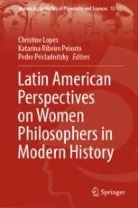
This book presents Latin American Perspectives on women philosophers, comprising selected articles from the First International Conference of Women in Modern Philosophy that took place in Rio de Janeiro City, Brazil, Latin America, in June of 2019. The conference brought together over twenty national, transnational, and international philosophers from seven countries, whose work combines historical and analytical insight to recover the philosophical legacy of women philosophers. Historical and analytical work on women’s philosophical thought constitute efforts to re-conceptualize what counts as philosophical knowledge and re-appraise the epistemic relevance of written material that women thinkers produced for most of history. This collection and the conference that gave origin to it are testimony to the enduring power of multinational and multicultural philosophical collaboration.
-
Volume XIV: Women in Pragmatism: Past, Present and Future
Miras Boronat, Núria Sara and Bella, Michela (2022): Women in Pragmatism: Past, Present and Future, Basel: Springer Nature Switzerland AG.
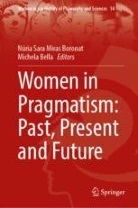
This book offers a selection of the papers of the Women in Pragmatism International Conference held at the University of Barcelona in January 2020. The conference gathered women and non-binary scholars from twelve different countries. This was the first pragmatist conference organized entirely by women and non-binary persons. It has initiated a stable network of mentoring and support analogous to other women philosophers’ organizations. The book provides paths to reconstruct the roots of pragmatism, integrating the works of women pragmatists of the past and linking them to the current developments of feminist and pragmatist topics. Scholars of different countries, status, and backgrounds serve as a powerful example of the trend toward interdisciplinary cooperation and versatility we might expect for the future of pragmatism. The book is of interest for scholars interested in both pragmatism and feminism, from various perspectives ranging from psychology to semiotics, logic, and sociology, wishing to expand their horizons and understand their relevant interactions.
-
Volume XV: Women in the History of Analytic Philosophy
Peijnenburg, Jeanne & Verhaegh, Sander (2023): Women in the History of Analytic Philosophy.Basel: Springer Nature Switzerland AG.
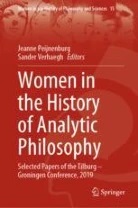 This book contains a selection of papers from the workshop Women in the History of Analytic Philosophy held in October 2019 in Tilburg, the Netherlands. It is the first volume devoted to the role of women in early analytic philosophy. It discusses the ideas of ten female philosophers and covers a period of over a hundred years, beginning with the contribution to the Significs Movement by Victoria, Lady Welby in the second half of the nineteenth century, and ending with Ruth Barcan Marcus’s celebrated version of quantified modal logic after the Second World War. The book makes clear that women contributed substantially to the development of analytic philosophy in all areas of philosophy, from logic, epistemology, and philosophy of science, to ethics, metaphysics, and philosophy of language. It illustrates that although women’s voices were no different from men’s as regards their scope and versatility, they had a much harder time being heard. The book is aimed at historians of philosophy and scholars in gender studies.
This book contains a selection of papers from the workshop Women in the History of Analytic Philosophy held in October 2019 in Tilburg, the Netherlands. It is the first volume devoted to the role of women in early analytic philosophy. It discusses the ideas of ten female philosophers and covers a period of over a hundred years, beginning with the contribution to the Significs Movement by Victoria, Lady Welby in the second half of the nineteenth century, and ending with Ruth Barcan Marcus’s celebrated version of quantified modal logic after the Second World War. The book makes clear that women contributed substantially to the development of analytic philosophy in all areas of philosophy, from logic, epistemology, and philosophy of science, to ethics, metaphysics, and philosophy of language. It illustrates that although women’s voices were no different from men’s as regards their scope and versatility, they had a much harder time being heard. The book is aimed at historians of philosophy and scholars in gender studies.An articel on Women in analytical philosophy has been published. Read it here.
PDF: The lost women of early analytic philosophy _ Aeon Essays
-
Volume XVI: Hedwig Conrad-Martius and Edith Stein: Philosophical Encounters and Divides
Calcagno, Antonio and Miron, Ronny (2022): Hedwig Conrad-Martius and Edith Stein: Philosophical Encounters and Divides.Basel: Springer Nature Switzerland AG.
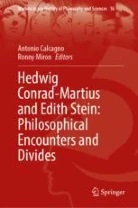
This book focuses on the unique philosophical relationship between Hedwig Conrad-Martius and Edith Stein. The two phenomenologists discussed and debated insights and ideas about the nature of the soul, phenomenology, personhood and individuality, animal life, nature, being, and God. This book brings together for the first time leading international scholars of phenomenology to explore the philosophical exchange between both Conrad-Martius and Stein. This is an important book for understanding the development of the phenomenological movement and key phenomenological ideas and methods. It provides a critical and comprehensive overview of the key issues that helped frame both phenomenologists’ philosophical trajectories. Additionally, the ideas of Conrad-Martius and Stein are mined to address contemporary questions surrounding such topics as personal identity, animal versus human personhood, contemporary atheism, and the relationship between religion and science. The book will have great appeal to phenomenologists, philosophers, and historians of philosophy.
-
Volume XVII: Else Voigtländer: Self, Emotion, and Sociality
Ferran, Ingrid Vendrell (2022): Else Voigtländer: Self, Emotion, and Sociality. Basel: Springer Nature Switzerland AG.

This book is the first to offer a full account of the philosophical work of Else Voigtländer. Locating the sources of her thought in the philosophy and psychology of the nineteenth and twentieth19th and 20th centuries in figures such as Nietzsche and Lipps, the volume book uncovers and examines Voigtländer’s intellectual exchanges with both phenomenology and psychoanalysis. The major themes within her work are considered in 12 expertly written chapters that also cover more recent developments in the philosophy of self, emotion, and sociality. The book appeals to scholars who are interested in the history of philosophy, and in particular of phenomenology, as well as those working on the philosophical roots of psychology and in women’s studies.
-
Volume XVIII: Knowledge, Mind and Reality: An Introduction by Early Twentieth-Century American Women Philosophers
Katzav, Joel & Vaesen, Krist & Rogers, Dorothy (2023): Knowledge, Mind and Reality: An Introduction by Early Twentieth-Century American Women Philosophers.Basel: Springer Nature Switzerland AG.
ISBN: 9783031244360
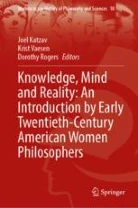
This book is the first volume featuring the work of American women philosophers in the first half of the twentieth century. It provides selected papers authored by Mary Whiton Calkins, Grace Andrus de Laguna, Grace Neal Dolson, Marjorie Glicksman Grene, Marjorie Silliman Harris, Thelma Zemo Lavine, Marie Collins Swabey, Ellen Bliss Talbot, Dorothy Walsh and Margaret Floy Washburn. The book also provides the historical and philosophical background to their work. The papers focus on the nature of philosophy, knowledge, the philosophy of science, the mind-matter nexus, the nature of time, and the question of freedom and the individual. The material is suitable for scholars, researchers and advanced philosophy students interested in (history of) philosophy; theories of knowledge; philosophy of science; mind, and reality.
-
Volume XIX: Women Philosophers from Non-Western Traditions: The First Four Thousand Years
Waithe, Mary Ellen & Boos Dykeman, Therese (2023) Women Philosophers from Non-Western Traditions: The First Four Thousand Years. Basel: Springer Nature Switzerland AG.

ISBN: 9783031285622
This book presents the views of 22 women philosophers from outside the Greco-Roman and Judeo-Christian worlds. These eminent thinkers are from Mesopotamia, India, Tibet, China, Korea, Japan, Australia, America, the Philippines and Nigeria. Six philosophers, the earliest of whom predates the Greek pre-Socratics by two thousand years, lived at “the dawn of philosophy”; another six from late Antiquity through the Classical period; five more taught and wrote during the Middle Ages up to the Age of Exploration, and yet five others were active during the modern period to the mid-twentieth century. Most belonged to major philosophical traditions: Hinduism, Buddhism, Confucianism, Taoism, Zen, or Sufism. The chapters of the book describe the life and views of the philosophers, outline the fundamental features of their respective schools, and contain translations of their writings. The book is intended for scholars of philosophy and women’s studies who wish to expand their knowledge of non-Western philosophical traditions and is ideally suited for undergraduate education. Comprehensive multilingual bibliographies of carefully documented sources offer scholars many promising resources for further research.
-
Volume XX: Exploring the Contributions of Women in the History of Philosophy, Science, and Literature, Throughout Time
Harry, Chelsea & Vlahakis, George (2024) Exploring the Contributions of Women in the History of Philosophy, Science, and Literature, Throughout Time. Basel: Springer Nature Switzerland AG.
ISBN: 9783031396298

This book explores contributions by some of the most influential women in the history of philosophy, science, and literature. Ranging from Sappho and Sophie Germain to Stebbing and Evelyn Fox Keller, this work ultimately demonstrates the impact these non-canonical, sometimes unknown or hidden, sources had, or may have had, on the recognized male leaders in their fields, from Aristotle to Pascal, Kant, Whitehead, and Russell. Chapters reflect philosophical pluralism, both analytic and continental themes, and cover figures reaching across the entire history of ideas in the West, from pre-historic times to the twentieth century. Anyone interested in coming to know or in preparing to teach women in the history of philosophy, science, and literature will appreciate this collection and its myriad insights into the still unrecognized voices of non-canonical sources across these disciplines.
-
Volume XXI: Teaching Women Philosophers: Ideas and Concepts from Women philosophers’ Writings over 2000 Years
Hagengruber, Ruth E. (2024) Teaching Women Philosophers: Ideas and Concepts from Women philosophers’ Writings over 2000 Years. Basel: Springer Nature Switzerland AG.
ISBN: 9783031592973
 This book expands the known canon by presenting arguments and concepts from women philosophers, from all periods of the history of philosophy, from antiquity to the present day. The collaborative collection is an undertaking that emerged from intensive discussions on how to expand the philosophical canon, which formed the conclusion of the Libori Summer School 2019. This Libori Summer School, the third in a row, was held to enhance the study of texts written by women philosophers from Antiquity up to now and intended to give opportunity to young scholars to connect and to build networks.
This book expands the known canon by presenting arguments and concepts from women philosophers, from all periods of the history of philosophy, from antiquity to the present day. The collaborative collection is an undertaking that emerged from intensive discussions on how to expand the philosophical canon, which formed the conclusion of the Libori Summer School 2019. This Libori Summer School, the third in a row, was held to enhance the study of texts written by women philosophers from Antiquity up to now and intended to give opportunity to young scholars to connect and to build networks.Presenting such a collection is even more urgent today because a diversification of the canon has long been called for. Nevertheless, to date there is little explicit material available for this purpose. To make this book suitable for both academics and students, it is structured in such a way that readers can use excerpts and individual chapters from it that suit their needs, be it in moral philosophy, politics, or phenomenology, etc. Containing chapters on women such as Suor Juana, Emilie Du Châtelet, and Nisia Floresta and supplemented by contextualization, namely by some brief biographical information and by the systematic integration of her argument into the debates of the respective periods, this book is an important resource highlighting the achievements and value of women in philosophy and calling for a further diversification of the canon.
-
Volume XXII: New Voices on Women in the History of Philosophy
Carus, Clara (2024)New Voices on Women in the History of Philosophy. Basel: Springer Nature Switzerland AG.
ISBN: 9783031629013
This book promotes entirely new insights into women’s contributions to the history of philosophy and boasts papers spanning the centuries from Antigone until twentieth century phenomenology, covering fields from logic to mysticism, stretching from Brazil to Early Modern Europe. The book is of interest for all scholars and students of the history of philosophy, but especially for those who are interested in women philosophers and in new narratives in the history of philosophy. The book is representative of the immense scope of academic discussion women were involved in over the centuries as well as their varying styles and methods. It features papers in logic and in mysticism, presents papers on female authors in Antiquity and in the twenty-first century and it includes papers on phenomenology and analytic philosophy. The chapters consider philosophical positions in literature and drama, in letters and in classical philosophical treatises, ensuring this book contributes significantly to research on the individual women authors, who are all to date still understudied figures.
-
Volume XXIII: Émilie Du Châtelet in Relation to Leibniz and Wolff
Carus, Clara und McDonough, Jeffrey K. (Hrsg.) (2025): Émilie Du Châtelet in Relation to Leibniz and Wolff: Similarities and Differences, Band 23, Springer Nature.
ISBN: 978-3-031-80540-0
This book offers the first detailed comparison between Émilie Du Châtelet’s philosophy and her predecessors G.W. Leibniz and Christian Wolff. It highlights the similarities and the differences between her work and the ideas of Leibniz and Wolff. The book’s chapters explore a wide range of key concepts and topics, including freedom, love, space, extension, certainty, probability, the continuum, time, eternity, the world apart doctrine, and the principle of sufficient reason. The book as a whole situates Du Châtelet’s thought in the context of her predecessors and highlights how Du Châtelet’s understanding of her sources laid the foundations for the development of her own ideas. This edition will be of crucial interest to the growing community of scholars working on Du Châtelet’s thought as well as scholars of Early Modern Philosophy more generally.
-
Volume XXIV: Mary B. Hesse (1924–2016): Metaphors, Models, and the Growth of Scientific Knowledge
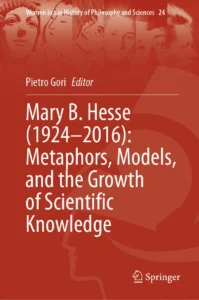 Gori, P. (Ed.). (2025). Mary B. Hesse (1924–2016): Metaphors, Models, and the Growth of Scientific Knowledge.Springer Nature Switzerland.
Gori, P. (Ed.). (2025). Mary B. Hesse (1924–2016): Metaphors, Models, and the Growth of Scientific Knowledge.Springer Nature Switzerland.ISBN: 978-3-031-95154-1
This volume explores the work of Mary B. Hesse (1924–2016), a pivotal figure in twentieth-century philosophy of science. At a time when the foundations of an integrated approach to the history and philosophy of science were being established, Hesse, as a female philosopher, offered a distinctive and influential contribution grounded in a post-empiricist understanding of the natural sciences. Central to her thought was a focus on the metaphorical and analogical value of scientific language, in contrast to views assessing its literal significance. Hesse also departed from traditional hypothetico-deductive accounts of scientific methodology and theory structure, advancing instead perspectives rooted in both historical and contemporary scientific practices.
To mark the centenary of her birth, this book brings together an international group of scholars to re-examine and engage with Hesse’s intellectual legacy. The chapters address the central themes of her work and situate them within her broader philosophical context. Each contribution adopts a cross-disciplinary perspective, highlighting the continued relevance of Hesse’s ideas to current debates in the philosophy of science.
This volume will be of particular interest to scholars in the history and philosophy of science, as well as those engaged in gender studies and the study of women in philosophy. -
Volume XXV: Stein and Husserl’s Phenomenology of the Social in Ideas II
-Forthcoming-
Lebech, M. (Hrsg.). (2026). Stein and Husserl’s Phenomenology of the Social in Ideas II. Springer Cham.
ISBN: 978-3-032-17338-6
This book presents a collection of articles most of which stem from papers given at the conference Stein’s and Husserl’s Intertwined Itineraries 1916-25 with Focus on Ideas II, hosted online, during COVID at the Centre for the History of Women Philosophers and Scientists, University of Paderborn, 20-21 May 2021. The aim of the conference was to contribute towards clarifying the respective positions of Stein and Husserl concerning the relationship between person and intersubjectivity, with an emphasis on identifying the extent to which their respective positions inform Ideas II. This is discussed under four headings: 1. the text of Ideas II and the collaboration between Stein and Husserl; 2. intersubjectivity and social ontology; 3. the distinction between the adjacent positions of Husserl and Stein; and 4. the possibility of combining transcendental intersubjectivity with philosophical anthropology.
-
Volume XXVI: Food, Plants, Remedies and Healing Practices: Women’s Ideas in the History of Medicine
-Forthcoming-
Muller, J. (Hrsg.). (2026). Food, Plants, Remedies and Healing Practices: Women’s Ideas in the History of Medicine. Springer Cham.
ISBN: 978-3-032-17765-0
This book examines the contributions of women to the history of philosophy and medicine, as well as the traditional medical knowledge that has been employed in households. Women have played integral roles in the history of medicine, often serving as healers, caretakers, midwives and guardians of traditional knowledge surrounding food, plants, remedies, and healing practices. However, women’s writings are often overlooked or marginalized in mainstream narratives because they did not write in the scientific language of Latin, and because their writings were not in the conventional form of a published book. The work, therefore, considers a diverse range of women, from Hildegard von Bingen and Oliva Sabuco to Maria Deraismes in the 19th century, midwives in Germany and numerous other women in European households. It demonstrates the significant influence of female knowledge and practices in the field of medicine, remedies, chemistry and healing practices. The chapters predominantly reflect on plants, food and practical remedies used and tested by women. Those engaged in research or teaching on the history of philosophy and medicine will find this collection invaluable, as it offers insights into a domain that has been relatively unexplored and lacks a substantial corpus of documented evidence.
-
Volume XXVII: The History of Women Philosophers: Festschrift in Honour of Mary Ellen Waithe
-Forthcoming-
Hagengruber, R. E. (Hrsg.). (2026). The history of women philosophers: Festschrift in honour of Mary Ellen Waithe. Springer Cham.
ISBN: 978-3-032-16663-0
This book is a tribute to one of the most influential philosophers in the history of philosophy in recent times. With her four-volume work title “A history of Women Philosophers” and the volume of the non-Western history of philosophers, published in 2024, Mary Ellen Waithe’s writings have an international significance. Colleagues and friends, who have been companions for many years, have gathered in this book to honor her work. Contributions from the Middle Ages to the present, from the philosophy of religion to logic, cover a broad field that will attract equally broad interest. An otherwise unencountered collection of ideas is presented here, united by the bond of research into the history of women philosophers.
German Springer Book Series: Frauen in Philosophie und Wissenschaft. Women Philosophers and Scientists
Editor: Ruth Hagengruber
“The history of women’s contributions to philosophy and the sciences dates back to the very beginnings of these disciplines. Theano, Hypatia, Du Châtelet, Lovelace, Curie are only a small selection of prominent women philosophers and scientists throughout history. The research in this field serves to revise and to broaden the scope of the complete theoretical and methodological tradition of these women.
The Springer Series Women Philosophers and Scientists provide a platform for scholarship and research on these distinctive topics. Supported by an advisory board of international excellence, the volumes offer a comprehensive, up-to-date source of reference for this field of growing relevance.
The Springer Series Women Philosophers and Scientists publish monographs, handbooks, collections, lectures and dissertations.
For related questions, contact the publisher or the editor.”
-
Volume I: Émilie Du Châtelets Institutions physiques
Editor: Reichenberger, Andrea
The focus of this book is the question of the significance and application relevance of the methodology of Émilie Du Châtelets for the field of physics in the 18th century. Andrea Reichenberger shows that principles and hypotheses are the foundation of scientific knowledge for Émilie Du Châtelet.
Language: German
-
Volume II: Übungen im politischen Denken
Editor: Robaszkiewicz, Maria
In her book, Maria Robaszkiewicz asks what constitutes political competence, what are the underlying capabilities of participation in the political process and how can a political sphere be created which, despite the plurality of opinions, offers a space for political community. She draws on Hannah Arendt’s concept of political thinking, which gives possible answers to these questions.
Language: German
-
Volume III: Émilie Du Chatelet und die deutsche Aufklärung
Editors: Ruth Hagengruber, Hartmut Hecht
This volume introduces the newest research on the physicist, mathematician and philosopher Emilie Du Châtelet (1706-1749). Emilie Du Châtelet enjoyed a high reputation during the German Enlightenment. She combined Leibniz’ metaphysics with Newton’s physics and made astonishing discoveries which led physics on the way to Einstein’s energy equation. Her works were translated into German immediately and Kant referred to her in his first dissertation from 1747. The collection presents texts which discuss the influence of the German Enlightenment on Du Châtelet and Du Châtelet’s influence on German philosophy. The big names of the era can be found here: Leibniz, Wolff, Boskovic, Euler, Friedrich II, Voltaire, La Mettrie and many other great figures of the Enlightenment are examined in their connection with Du Châtelet.
Language: German
-
Volume IV: Grete Henry-Hermann. Philosophie – Mathematik – Quantenmechanik
Editor: Herrmann, Kay
This book is an appraisal of Grete Henry-Hermanns epistemology and philosophy of nature. As a student of mathematician Emmy Noether and the philosopher Leonard Nelson she was of the early interpreters of quantum mechanics. Henry-Hermanns natural-philosophical and epistemological writings are summarized in this book, for the first time. Correspondences with Carl Friedrich von Weizsäcker, Werner Heisenberg and Gustav Heckmann are also included i this issue.
Language: German
-
Volume V: Philosophinnen der griechischen Antike
Editor: Maria Nühlen
”
In diesem Buch werden 39 Philosophinnen der griechischen Antike in ihrem Denken vorgestellt, ihre Werke analysiert sowie interpretiert und ihnen ein Platz in der abendländischen Philosophiegeschichte zugewiesen. Als Anliegen formuliert die Autorin: Die Rehabilitierung der in Vergessenheit geratenen Arbeiten von Philosophinnen und die Ergänzung der abendländischen Philosophie um die nicht berücksichtigten philosophischen Beiträge eben dieser Frauen geht es. Eine kritische Analyse im kultur- und philosophiehistorischen sowie im lebensweltlichen Kontext der Frauen bildet die Grundlage. Durch eine dezidierte Verortung in historische Zeiten, Orte und kulturelle Räume kann sich uns die Lehre der Philosophinnen differenzierter erschließen. Das Klischee der ungebildeten und von der Außenwelt abgeschlossenen Lebenswelt der Griechinnen jener Zeit wird als Mythos entlarvt, denn es traf nur zum Teil auf die Athenerin der klassischen Zeit zu, nicht aber für die Frauen anderer Kulturkreise, aus denen 38 der hier vorgestellten Philosophinnen stammen. In der Spurensuche geht die Autorin akribisch und systematisch den Quellen nach und diskutiert kritisch das Material, das von der Antike bis zur Gegenwart reicht. Sie durchforstet Enzyklopädien, historische Texte, Fragmente und Briefe, analysiert die ältesten Quellen bis hin zur Rezeptionsgeschichte.
Das Werk eignet sich sowohl für das philosophische Fachstudium als auch für den Unterricht in Schulen, dürfte darüber hinaus für einen relativ großen Kreis von Lesenden der Philosophie von Interesse sein.”
Language: German
-
Volume VI: Eine Naturforscherin zwischen Fake, Fakt und Fiktion
Editors: Nicole Hoffmann, Wiebke Waburg
“Was Amalie Dietrich, eine naturwissenschaftliche Sammlerin des 19. Jahrhunderts, für eine multidisziplinäre Auseinandersetzung heute so interessant macht, ist die besondere Quellenlage: Neben den von ihr präparierten Museumsstücken liegt eine Vielzahl an Publikationen über sie vor, in denen sie und ihr Werk höchst unterschiedlich thematisiert werden: u.a. als frühe Naturforscherin, alleinerziehende Mutter, feministische Pionierin oder auch als koloniale Grabschänderin. Die Beiträge des Sammelbands loten jeweils einen Aspekt dieses Facettenreichtums aus, um dem widersprüchlichen Bild auf die Spur zu kommen.”
Language: German
-
Volume VII: Gelehrte Frauen der Frühaufklärung
Editors: Corinna Dziudzia, Sonja Klimek
In der Frühaufklärung eröffneten sich für Frauen, wenngleich teilweise nur vorübergehend, zahlreiche Tätigkeitsfelder, z.B. in den Künsten, der Medizin und der Theologie. Frauen führten Salons, betätigten sich als Mäzeninnen, Übersetzerinnen – oder (verkleidet) sogar als Soldatinnen. Universitäten, Akademien und Gesellschaften verliehen den gelehrten Frauen Preise und Doktorwürden für ihre Beiträge zur Mathematik, Philosophie und Dichtkunst.
Im Zentrum des Bandes stehen tätige Frauen des ausgehenden 17. und des 18. Jahrhunderts. In interdisziplinärer Perspektive fragen die Aufsätze danach, was der Beitrag dieser Frauen zu ihrem jeweiligen Feld konkret war, in welchen Beziehungsnetzwerken sie standen und was die Bedingungen ihres Schaffens kennzeichnete. Wie wurden sie von den Zeitgenossen wahrgenommen? Wurden sie als ‚einsame Wunderthiere‘ bestaunt und waren im Wesentlichen singuläre Ausnahmen – oder fungierten sie als ‚vernetzte Akteurinnen‘ und nahmen aktiv an den Auseinandersetzungen ihrer Zeit teil?
-
Volume VIII: Pionierinnen der Psychiatrie in Frankreich und Deutschland (1870 – 1945)
Editor: Anna Prokop
ISBN: 9783658400088
Durch die biographische Herangehensweise gewährt diese Publikation einen differenzierten und in seiner Form einzigartigen Blick auf den Werdegang ärztlicher Pionierinnen in Deutschland und Frankreich von 1870 bis 1945. Dargestellt werden die Lebensläufe von sechs Psychiaterinnen, diese sind eingebettet in eine vergleichende Psychiatriegeschichte beider Länder mit besonderem Augenmerk auf die Entwicklungen der Psychiatrie in Zeiten des Zweiten Weltkrieges. Informationen zum Hochschulzugang von Frauen, dem Medizinstudium der ersten Studentinnen, zu Forschung sowie weiblicher Berufstätigkeit von Ärztinnen in beiden Ländern runden das Werk ab.
-
Volume IX: Grete Henry-Hermann: Sittlichkeit und Vernunft
Editors: Kay Herrmann, Barbara Neißer
ISBN: 978-3-658-41992-9
Der vorliegende Band befasst sich mit Grete (Henry-)Hermanns Überlegungen zur Ethik, die als kritische Reflexion der Ethik ihres Lehrers Leonard Nelson zu verstehen sind. Ihre Auseinandersetzung mit der Ethik Nelsons begann mit der Frage, nach welchen Gesichtspunkten eine umfassend gebildete Person ihre Entscheidungen trifft. Diese Frage beschäftigte Grete (Henry-)Hermann bereits in ihren frühen Arbeiten. Die in den Gesprächen mit Nelson aufgeworfenen Fragen ließen Grete (Henry-)Hermann nicht mehr los. Von ihrem Ringen um Antworten zeugt, dass ihre Lösungsvorschläge erst mehr als 25 Jahre nach Leonard Nelsons Tod folgten. Erst 1953 erschien Grete (Henry-)Hermann Schrift „Die Überwindung des Zufalls. Kritische Betrachtungen zu Leonard Nelsons Begründung der Ethik als Wissenschaft“, in der sie sich kritisch mit Leonard Nelsons Ethik auseinandersetzte. Sie betont die Bedeutung der Interessenabwägung als Prüfkriterium für die Legitimation und Geltung moralischer und sittlicher Normen und empirischer Rechte, Gesetze und Handlungen sowie den prozessualen Charakter der Ethik als ständige Überprüfung von Normen, Gesetzen und Handlungen an den moralischen Prinzipien der Vernunft – Aspekte, die gerade in einer Zeit globaler Bedrohungen und Interessengegensätze zwischen den Großmächten von besonderer Aktualität sind.
-
Volume X: Grete Henry-Hermann: Die Rationalität des Widerstands
Editors: Kay Herrmann, Barbara Neißer
ISBN: 978-3-658-41986-8
Grete (Henry-)Hermann war nicht nur eine Philosophin, die mit Physikern wie Werner Heisenberg und anderen Wissenschaftlern auf Augenhöhe über die Interpretation der Quantenphysik diskutierte. Sie war auch eine mutige und engagierte Sozialistin, Pädagogin und Antifaschistin. Im Kampf gegen den Nationalsozialismus trat sie in die Redaktion der ab Januar 1932 vom Internationalen Sozialistischen Kampfbund (ISK) – einer kleinen antifaschistischen Widerstandsgruppe – herausgegebenen Tageszeitung „Der Funke“ ein. Dieser Band versammelt ihre wichtigsten politischen Beiträge.
Grete (Henry-)Hermanns Stellungnahmen zum politischen Zeitgeschehen, aber auch ihre grundsätzlichen Überlegungen zur Rechtsphilosophie, zur Psychologie sowie ihre Auseinandersetzung mit dem Marxismus dokumentieren eindrucksvoll den Prozess der Praktischwerdung von kritischer Philosophie, aber auch den Reformprozess innerhalb einer Philosophie, die in der Tradition von Immanuel Kant, Jakob Friedrich Fries und Leonard Nelson steht.
-
Volume XI: Grete Henry-Hermann: Politik, Ethik und Erziehung
Editors: Kay Herrmann, Barbara Neißer
ISBN: 978-3-658-43083-2
Dieser Band versammelt erstmals vollständig die Schriften Grete Hermanns zu Ethik, Recht, Erziehung und Bildung.
-
Volume XII: Das Prinzip vom zureichenden Grunde bei Émilie Du Châtelet
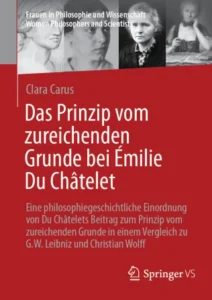 Author: Clara Carus
Author: Clara CarusISBN: 978-3-658-46349-6
Dieses Buch arbeitet Émilie Du Châtelets Beitrag zur Philosophie- und Wissenschaftsgeschichte im Übergang von der frühen Neuzeit in die Moderne in Hinblick auf ihr Verständnis des Prinzips vom zureichenden Grunde auf. Du Châtelets Bestimmung, Erweisung und Anwendung des Prinzips vom zureichenden Grunde wird im Vergleich zur Auslegung desselben Prinzips bei ihren Vorgängern Gottfried Wilhelm Leibniz und Christian Wolff untersucht. Das Prinzip vom zureichenden Grunde ist ein fundamentales Erkenntnisaxiom, dessen Verfechtung und Bestimmung die Rationalisten der Frühmoderne prägt. Dieses Buch erarbeitet, wie Du Châtelets Bestimmung des Prinzips den Ausgang ihres Zeitalters prägt. Das Buch richtet sich an Studierende, Lehrende und Forschende der Philosophie- und Wissenschaftsgeschichte der Frühmoderne, sowie an alle, die an Kausalitätstheorien und dem Prinzip vom zureichenden Grunde interessiert sind.
-
Volume XIII: Zwischen Wir und Ich
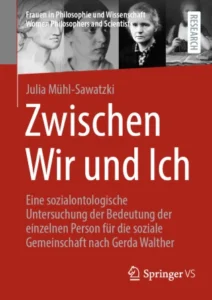 Author: Julia Mühl-Sawatzki
Author: Julia Mühl-SawatzkiISBN: 978-3-658-48606-8
Im Mittelpunkt des Bandes steht die Auseinandersetzung mit dem frühen Schaffen der Phänomenologin Gerda Walther (1897-1977). Es sind die folgenden drei Fragen, die hier untersucht werden: a) In welchem sozialontologischen Verhältnis steht die Person zur sozialen Gemeinschaft nach Walther, b) kann diese Person willensfrei in der sozialen Gemeinschaft agieren und c) wie lässt sich Walther philosophisch verorten? Die Herausforderung der Beantwortung dieser Fragen liegt in dem Spannungsfeld zwischen historischem Materialismus und phänomenologischem Subjektivismus, dem Walther gegenübersteht. Julia Mühl-Sawatzki zeigt, dass Walther einen anti-singularistischen Ansatz hinsichtlich des sozialontologischen Verhältnisses zwischen der einzelnen Person und der sozialen Gemeinschaft vertritt. Die daraus ableitbaren Schlussfolgerungen für das Moment der Willensfreiheit innerhalb der sozialen Gemeinschaft sowie Walthers philosophischer Verortung werden in dieser Arbeit begründet dargelegt.
You cannot copy content of this page









